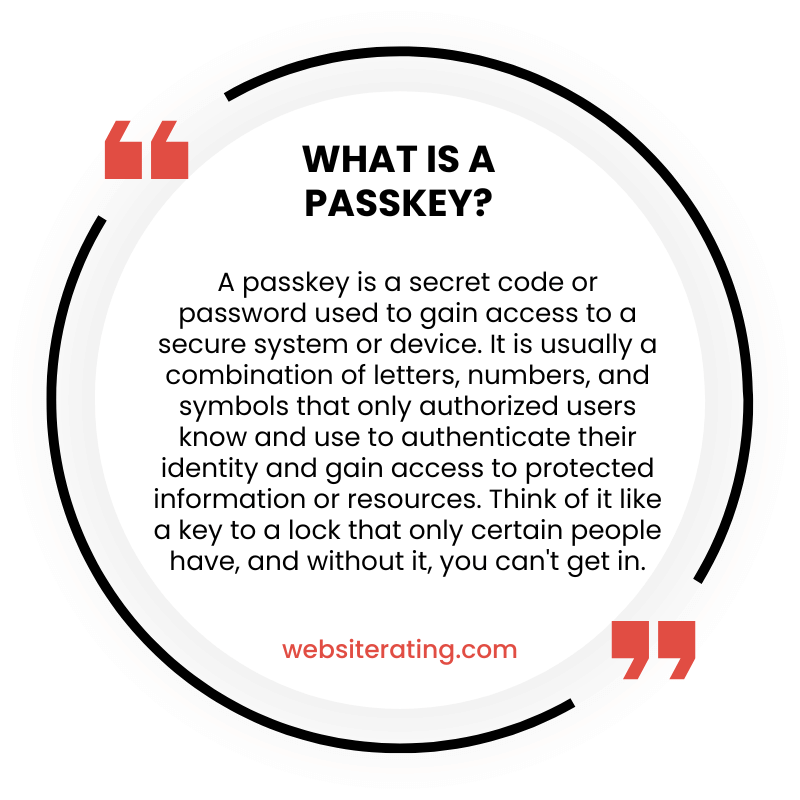Passwords are an essential part of our digital lives. As the number of online accounts we hold continues to grow, managing them in a secure manner can be challenging. To help with this process, many people use password managers that incorporate passkeys as a form of additional security.

A passkey is a security feature that requires users to enter an additional code or phrase before being granted access to their account. This article will provide an explanation of what passkeys are and how they work, as well as discuss the benefits associated with using them.
What is a Passkey?
Utilizing a secure authentication method can be an important part of establishing strong online security. A passkey is a type of authentication method that is used to verify the identity of users and protect access to data or services.
It typically involves a combination of letters, numbers, and symbols that must be accurately entered in order for the user’s identity to be verified. Passkeys are often referred to as passwords but may also have additional components such as personal identification numbers (PINs) or security questions.
In many cases, they must be changed periodically in order to maintain their effectiveness against potential hackers or unauthorized access. In addition, passkeys should not be shared with anyone other than the intended user in order to keep them safe and secure from misuse.
How Does a Passkey Work?
Incorporating a passkey into one’s security system can provide an additional layer of protection for the user. Passkeys are unique strings of characters that are used to authenticate a user when accessing an online account or application. The passkey is typically only known to the user, and is different from passwords which may be shared between multiple users.
A passkey usually consists of a series of numbers or letters, and can also contain special characters such as exclamation points. When attempting to access an account or application, the user must enter their passkey in order to gain entry. If the correct combination is entered, then they will be granted access; if not, then access will be denied.
Passkeys can also be used in conjunction with two-factor authentication (2FA) protocols, wherein the user must provide both a password and their corresponding passkey before they can gain access. This type of authentication provides another layer of security for sensitive accounts or applications since it requires two separate forms of credentials to authenticate a single individual’s identity.
Furthermore, most 2FA protocols are designed so that even if someone obtains one form of identification (e.g., either the password or the passkey), they still cannot gain access without having both pieces of information simultaneously at hand.
Benefits of Using a Passkey
By implementing a passkey, users can gain an additional layer of protection for their accounts or applications. Passkeys are used to add an extra step of verification and authentication when accessing any account or application. This form of security is especially beneficial in high-security environments where sensitive information needs to be kept secure and confidential.
A passkey requires users to enter both a username and password, as well as a unique code that only the user has access to, such as a physical token or biometric device. Using this method helps protect against unauthorized access from hackers or malicious actors who would otherwise have easy access to these accounts. Passkeys also provide more control over which individuals can access protected data by requiring each user to enter their own unique code before they can log in.
Additionally, passkeys are often used for two-factor authentication (2FA) protocols which further adds another layer of security by requiring users to verify themselves with two different methods such as email address confirmation, SMS messages, etc., before they can gain entry into the system.
Summary
Passwords are essential for online security. Passkeys provide a secure and reliable way to protect digital accounts from unauthorized access.
By using a passkey, users can conveniently store multiple passwords in one secure location, eliminating the need to remember numerous logins and passwords. Moreover, passkeys come with additional features such as two-factor authentication, password strength meters, and password sharing options that make them even more beneficial to use.
As technology continues to evolve, so too will our need for more secure authentication methods; thus it is wise for individuals to consider investing in a passkey system that meets their needs. The security benefits of using a passkey far outweigh any negatives associated with its use and should be taken into consideration by anyone looking for an effective method of protecting their digital accounts.
More reading
A passkey is a new type of login credential that allows users to sign in to apps and websites without having to enter a password. Passkeys use public-key cryptography to authenticate access, generating a pair of related cryptographic keys instead of requiring users to create a password. Passkeys can be used with devices such as smartphones, and they can be unlocked using methods such as fingerprints or face scans (source: Dashlane, Google, How-To Geek, Tom’s Guide, Digital Trends).
